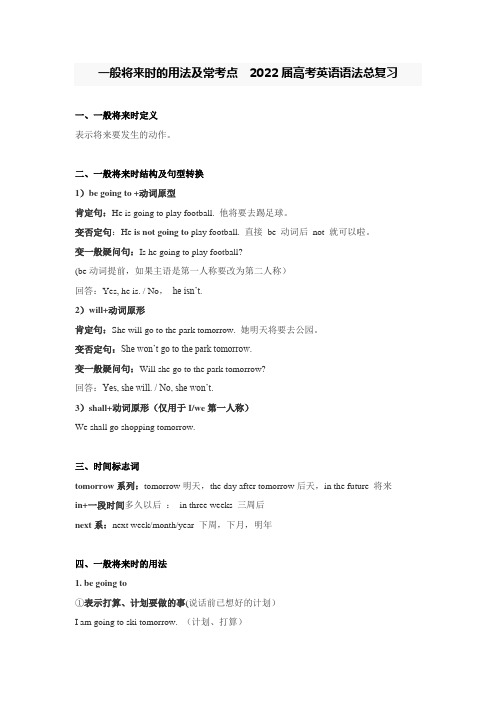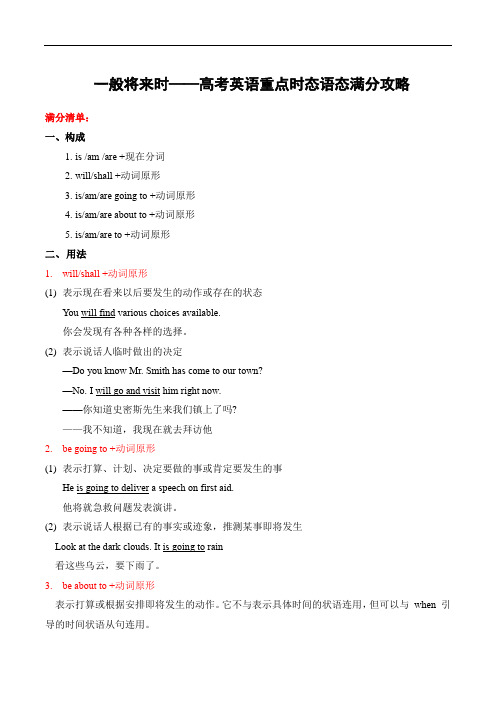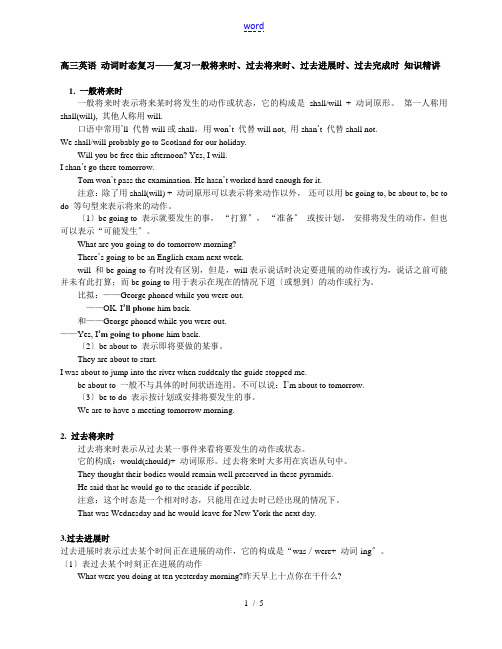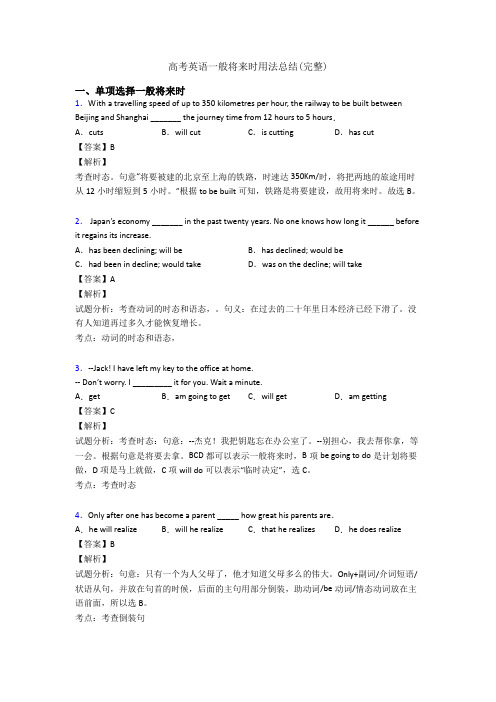高三英语一般将来时表达方式复习
一般将来时的用法及常考点 高考英语语法总复习

一般将来时的用法及常考点2022届高考英语语法总复习一、一般将来时定义表示将来要发生的动作。
二、一般将来时结构及句型转换1)be going to +动词原型肯定句:He is going to play football. 他将要去踢足球。
变否定句:He is not going to play football. 直接be 动词后not 就可以啦。
变一般疑问句:Is he going to play football?(be动词提前,如果主语是第一人称要改为第二人称)回答:Yes, he is. / No,he isn’t.2)will+动词原形肯定句:She will go to the park tomorrow. 她明天将要去公园。
变否定句:She won’t go to the park tomorrow.变一般疑问句:Will she go to the park tomorrow?回答:Yes, she will. / No, she won’t.3)shall+动词原形(仅用于I/we第一人称)We shall go shopping tomorrow.三、时间标志词tomorrow系列:tomorrow明天,the day after tomorrow后天,in the future 将来in+一段时间多久以后:in three weeks 三周后next系:next week/month/year 下周,下月,明年四、一般将来时的用法1. be going to①表示打算、计划要做的事(说话前已想好的计划)I am going to ski tomorrow. (计划、打算)我明天要去滑雪。
②有迹象表明要发生的事。
Loot at the dark clouds. It is going to rain. (迹象表明)2. Will①当下的决定(说话时才做的决定)- My car won’t start.- Don’t worry, I will come and give it a push.②表示一个将来的动作或状态,“要…,会…”She will go to school tomorrow.③表示不以人的意志为转移的自然发展的事。
英语时态一般将来时知识清单总结及用法

英语时态一般将来时知识清单总结及用法1、一般将来时的结构2、一般将来时的结构变化3、知识要点一般将来时的用法(1) 表示将来的动作或状态,常与tomorrow,this evening. next Monday (week,month,year,in ten minutes,someday,in 2018,in the future 等单词或短语连用。
如:They say that the weather will be good tomorrow. 据说明天是好天气。
I shall have supper soon. 我要吃晚饭了。
There will be a class meeting this afternoon. 今天下午开班会。
He will come to see you next Monday . 他下周一会来看你。
(2) 表示即将发生的或最近打算进行的事,常用“be going to+动词原形”。
如:How are you going to spend your holiday ? 你们打算怎样度假?(3) 表示按计划即将发生的动作,常用go,come,start,move,leave等动词的进行时态。
如:He is coming in a minute . 他很快就来。
(4) 表示按计划要发生的事或征求对方意见,或表示安排、命令、预定好要做的事情,常用“be to+动词原形”。
如:The concert is to take place on Friday evening . 音乐会要在下星期五举行。
(5)表示即将发生的动作,或者表示立刻要做的事情,近在眼前的将来,常用“be about to+动词原形”。
如:Hurry up! The train is about to leave . 快点!火车马上要开了○(6) 一般将来时中be going to结构与will的异同点:①be going to结构和will的相同点:都表示将来的动作或状态。
高考英语一般将来时用法详解

高考英语一般将来时用法详解一、单项选择一般将来时1.— Sorry, I ________ to buy the book you need for you.— Never mind. ________ it myself after school.A.forget; I’d rather buy B.forgot; I’ll buyC.forgot; I’m going to buy D.forget; I’d better buy【答案】B【解析】【详解】本题考查一般过去时和一般将来时。
解题步骤:1. 确定第一空:忘了买你需要的书发生在过去,用过去时。
2. 确定第二空:will/表示在听了对方话之后做出的反应。
句意:—对不起,我忘了买你需要的书。
—没关系。
放学后我自己买。
综上,故选B项。
2.If their marketing plans succeed, they ________ their sales by 20 percent.A.will increase B.have been increasingC.have increased D.would be increasing【答案】A【解析】句意:要是他们的市场计划成功了,他们将增加20%的销售额。
从句是一般现在时表将来,主句常用一般将来时或情态动词can/may+动词原形。
3.—Did you tell your parents about the result?—Oh, no, I forgot. I them now.A.will be calling B.will call C.am going to tell D.am to call【答案】B【解析】句意:A 选项是将来进行时,表示将来某个时间正在进行的动作;B、C、D均表示一般将来时。
will+v原形表示临时决定的;而be going to do和be to do是表示按计划或安排要做的事。
高中英语一般将来时知识点总结

高中英语一般将来时知识点总结高中英语一般将来时知识11.1 一般将来时的构成肯定句:主语 + shall/will + 动词原形...否定句:主语 + shall/will + not + 动词原形...疑问句:Shall/Will + 主语 + 动词原形...?疑问代词/疑问副词 + shall/will + 主语 + 动词原形...?1.2 一般将来时的肯定句句型:主语 + shall/will + 动词原形....在书面语中,如果主语是第一人称,常用“助动词shall + 动词原形”构成一般将来时的肯定句,即“I/we + shall + 动词原形”;shall可缩写为'll:If I have time tomorrow,I think I'll get a haircut.如果我明天有时间,我想去理个发在口语中,所有的人称都可以用will,即“主语(所有人称) + will + 动词原形...”;will可缩写为'll:Some day,I'll tell you.将来某一天我会告诉你的。
1.3 一般将来时的否定句句型:主语 + will/shall + not + 动词原形...一般将来时的否定句是在will/shall后加not;will not可缩写为won't;shall not可缩写为shan't:Mary won't go to the party.玛丽不会去参加晚会。
1.4 一般将来时的一般疑问句句型:Shall/Will + 主语 + 动词原形...回答方式:Yes,主语 + shall/will.No,主语 + shall/will + not.一般将来时的一般疑问句是将助动词shall/will置于主语之前(大写shall/will的第一个字母),在句尾加问号;这种语序是主语和谓语倒装语序:Will he come? 他来吗?Will you be at our next meeting? 我们下次开会你来吗?Will you be free tonight? —Yes,I will./No,I won't(be free).今晚你有空吗? ——是,我有空。
一般将来时——高考英语重点时态语态满分攻略

一般将来时——高考英语重点时态语态满分攻略满分清单:一、构成1.is /am /are +现在分词2.will/shall +动词原形3.is/am/are going to +动词原形4.is/am/are about to +动词原形5.is/am/are to +动词原形二、用法1.will/shall +动词原形(1)表示现在看来以后要发生的动作或存在的状态You will find various choices available.你会发现有各种各样的选择。
(2)表示说话人临时做出的决定—Do you know Mr. Smith has come to our town?—No. I will go and visit him right now.——你知道史密斯先生来我们镇上了吗?——我不知道,我现在就去拜访他2.be going to +动词原形(1)表示打算、计划、决定要做的事或肯定要发生的事He is going to deliver a speech on first aid.他将就急救问题发表演讲。
(2)表示说话人根据已有的事实或迹象,推测某事即将发生Look at the dark clouds. It is going to rain看这些乌云,要下雨了。
3.be about to +动词原形表示打算或根据安排即将发生的动作。
它不与表示具体时间的状语连用,但可以与when 引导的时间状语从句连用。
Ladies and gentlemen, you are about to hear a most incredible tale.女士们,先生们,你们马上就要听到一个令人非常难以置信的故事。
4.be to +动词原形(1)表示按计划或安排要做的事情The opening ceremony is to take place next Sunday.开幕式将于下周日举行。
(2)表示按职责、义务将要发生的动作You are to report it to the police.你应该报警。
英语语法:一般将来时解释集

英语语法:一般将来时解释大全一、基本定义一般将来时是英语时态的一种,表示将来的动作或状态。
它主要用于描述未来的计划、预测或期望发生的事情。
二、形式构成一般将来时的构成主要有以下几种形式:1. 基本结构:主语+ will /shall + 动词原形+ 其他成分。
这是最基本的一般将来时形式,表示将来的动作或状态。
2. be going to 结构:主语+ be(am, is, are)going to + 动词原形+ 其他成分。
这种结构表示计划或安排将要发生的事情,也可以表示根据目前的迹象或情况预测将会发生的事情。
3. be+动词不定式:主语+ be(am, is, are)to + 动词原形+ 其他成分。
这种结构表示计划或安排将来要做的事情。
4. be+动词ing:主语+ be(am, is, are)+ 动词ing形式+ 其他成分。
这种结构表示即将发生的动作,通常与“when”连用。
5. be+表示时间的介词短语:主语+ be(am, is, are)+ 表示时间的介词短语。
这种结构用于表示将来某个时间点的情况。
6. 将来时间状语:tomorrow, next week, in the future等以上就是一般将来时的主要构成形式。
需要注意的是,在具体使用时,应根据语境和上下文选择合适的构成方式。
三、用法场景1. 表达未来的计划或意图,例如:I will go to the beach next summer.2. 描述未来的预测或期望,例如:It will rain this afternoon.3. 在条件句中表示将来的结果,例如:If you study hard, you will pass the exam.四、与其他时态的区别1. 与现在进行时态的区别:现在进行时态强调正在进行的动作,而一般将来时态强调将来的动作或状态。
2. 与过去时态的区别:过去时态表示过去的动作或状态,与将来时间无关。
高三英语 动词时态复习——复习一般将来时、过去将来时、过去进行时、过去完成时 知识精讲

高三英语动词时态复习——复习一般将来时、过去将来时、过去进展时、过去完成时知识精讲1. 一般将来时一般将来时表示将来某时将发生的动作或状态,它的构成是shall/will + 动词原形。
第一人称用shall(will), 其他人称用will.口语中常用’ll 代替will或shall,用won’t 代替will not, 用shan’t 代替shall not.We shall/will probably go to Scotland for our holiday.Will you be free this afternoon? Yes, I will.I shan’t go there tomorrow.Tom won’t pass the examination. He hasn’t worked hard enough for it.注意:除了用shall(will) + 动词原形可以表示将来动作以外,还可以用be going to, be about to, be to do 等句型来表示将来的动作。
〔1〕be going to 表示就要发生的事,“打算〞,“准备〞或按计划,安排将发生的动作,但也可以表示“可能发生〞。
What are you going to do tomorrow morning?There’s going to be an English exam next week.will 和be going to有时没有区别,但是,will表示说话时决定要进展的动作或行为,说话之前可能并未有此打算;而be going to用于表示在现在的情况下道〔或想到〕的动作或行为。
比拟:——George phoned while you were out.——OK. I’ll phone him back.和——George phoned while you were out.——Yes, I’m going to phone him back.〔2〕be about to 表示即将要做的某事。
英语动词时态用法归纳:一般将来时

英语动词时态用法归纳:一般将来时一、一般将来时的构成一般将来时的由s hall / will+ 动词原形构成。
二、一般将来时的基本用法(1) 表示单纯的将要发生的动作或情况。
常与表示将来的时间状语连用。
如:Tomorrow will be Sunday. 明天是星期天。
They say that it will rain. 他们说要下雨。
I’ll be thirty-seven on my next birthday. 到下次生日,我就三十七岁了。
We won’t be free tonight. 今晚我们没空。
(2) 也可以表示临时决定要做的事。
如:—I thought I asked you to sweep the floor.—O h, I’m sorry. Mother, I will do it right now.—我原以为我让你扫地了。
—噢,对不起,妈妈,我就做。
—You have left the door open.—O h, so I have. I’ll go and lock it.—你忘了锁门。
—哦,是的。
我就去。
(3) 有时虽没有时间状语,但从意思上可以判断指将来的动作。
如:Who will take the chair? 谁当主席?You will pass the examination. 你会通过那个考试的。
The meeting won’t last long. 会开不了多久。
(4) 一般将来时有时还表示倾向和习惯性。
如:Oil will float on water. 油总浮在水面上。
Fish will die without water。
鱼离开水就会死掉。
The machine won't work because of a faulty connection. 机器电源线接错了,所以开不动。
三、表示将来时的几种方法(1) be going to+动词原形。
一般将来时的五种表达方法

一般将来时的五种表达方法Company number:【WTUT-WT88Y-W8BBGB-BWYTT-19998】专题讲座一般将来时的五种表达方法汝城五中曾春梅一般将来时am/is/are/going to + do和will/shall + do1) shall用于第三人称单数,常被will所代替,二者都可以缩写成'll。
will在陈述句中用于各人称,在征求意见时常用于第二人称。
Which paragraph shall I read first.Will you be at home at seven this evening2) be going to +动词原形或地点,表示将来。
a.主语的意图,即将做某事。
What are you going to do tomorrowb.计划,安排要发生的事。
The play is going to be produced next month。
c.有迹象要发生的事。
Look at the dark clouds, there is going to be a storm.3) be +不定式表将来,按计划或正式安排将发生的事。
We are to discuss the report next Saturday.4) be about to +不定式,意为马上做某事。
He is about to leave for Beijing.注意:be about to不能与tomorrow, next week等表示明确将来时的时间状语连用。
一般将来时1.一般将来时的基本概念一般将来时表示将来某一时刻的动作或状态,或将来某一段时间内经常的动作或状态。
一般将来时由助动词shall(第一人称),will(第二、三人称)+动词原形构成。
美国英语则不管什么人称,一律用will。
2.一般将来时的形式●will常简略为'll,并与主语连写在一起,如:I'll,he'll,it'll,we'll,you'll,they'll。
高考英语一般将来时用法总结(完整)题库

高考英语一般将来时用法总结(完整)题库一、单项选择一般将来时1.— I was very angry with Kelvin yesterday.— I know your feelings, but if you forgive him, you ______ a bigger man.A.will be B.have beenC.would be D.were【答案】A【解析】试题分析:考查时态。
本句考查时态。
If从句中常用一般现在时表将来,此时主句中应使用一般将来时。
根据这一用法,本题选择A。
考点:考查时态2.If my brother doesn’t go to the evening party, .A.neither do I B.I will either C.either will I D.nor will I【答案】D【解析】试题分析:考查倒装句:句意:如果我弟弟不去晚会,我也不去。
Neither/Nor+倒装句,表示“…也不是”,因为if条件句用一般现在时,代替一般将来时,所以主句是一般将来时,选D。
考点:考查倒装句3.It every day so far this month. I can't tell you if it tomorrow.A.rained; rains B.is raining; shall rainC.has been raining; rains D.has rained; will rain【答案】D【解析】试题分析:本题第一空应该使用现在完成式,关键词是后面的时间状语so far(到目前为止),so far通常都是和现在完成时连用。
第二空是一个if引导的宾语从句,并非if引导的条件句,在这个宾语从句中,时间状语是tomorrow,这是一个将来时的时间状语,故该宾语从句使用将来时。
句义:这个月到现在为止天天都在下雨,所以我无法告诉你明天是否还要要下雨。
高考英语一般将来时用法总结(完整)

高考英语一般将来时用法总结(完整)一、单项选择一般将来时1.With a travelling speed of up to 350 kilometres per hour, the railway to be built between Beijing and Shanghai _______ the journey time from 12 hours to 5 hours.A.cuts B.will cut C.is cutting D.has cut【答案】B【解析】考查时态。
句意“将要被建的北京至上海的铁路,时速达350Km/时,将把两地的旅途用时从12小时缩短到5小时。
”根据to be built可知,铁路是将要建设,故用将来时。
故选B。
2.Japan’s economy _______ in the past twenty years. No one knows how long it ______ before it regains its increase.A.has been declining; will be B.has declined; would beC.had been in decline; would take D.was on the decline; will take【答案】A【解析】试题分析:考查动词的时态和语态,。
句义:在过去的二十年里日本经济已经下滑了。
没有人知道再过多久才能恢复增长。
考点:动词的时态和语态,3.--Jack! I have left my key to the office at home.-- Don’t worry. I _________ it for you. Wait a minute.A.get B.am going to get C.will get D.am getting【答案】C【解析】试题分析:考查时态:句意:--杰克!我把钥匙忘在办公室了。
将来时的几种表达方式

一般将来时的几种表达方式一般将来时表示将来某个时间要发生的动作或存在的状态,也表示将来经常或反复发生的动作,常与表示将来的时间状语连用。
例如:tomorrow , tomorrow morning / afternoon …, the day after tomorrow , next year , next month …, from now on (从现在开始),in an hour (一小时后),in two days / weeks …等。
一般将来时的表示方法有以下多种形式:1. will / shall(1) will/shall do表示将来时间时,一般要与表示将来的时间状语连用,或通过一定的上下文来体现将来时间状语。
s hall只用于第一人称,will可以通用于各种人称。
在问句中shall常用于第一人称表示建议或征求对方意见。
例如:A. I shall write you a letter next month .我下个月给你写信。
B. He will come.他会来。
C. Shall we go to the park ?我们去公园好吗?注意:在You and I…或Both of us之后通常用will而不用shall,例:Both of us will be at the meeting tomorrow.明天我们俩都会出席会议。
(2) will/shall be doing因为在will/shall do中的will/shall也可理解为情态动词,所以有时会难区分它们是将来意义还是情态意义。
在英语口语中我们常用will/shall be doing来表示“单纯的”将来时间。
比较下列句子:I will come tomorrow.Will you come?我明天来!你来吗?(will表示意图和请求)I will be coming tomorrow.Will you be coming?我明天来,你来吗?(will在句中单纯表示将来)这一结构还表示不久或势必要发生的动作,例:The train will be arriving soon.火车很快就到站了。
高考英语语法一般将来时归纳总结

高考英语语法一般将来时归纳总结一、单项选择一般将来时1.---I don’t know when _____ tomorrow.---I will call you as soon as he_____.A.will he come; arrives B.he will come; arrivesC.he will come; will arrive D.will he come; will come【答案】B【解析】考查时态。
第一句为when 引导的宾语从句,从句的时态,要根据时态本身来决定,第二句为if 引导的条件状语,主句为一般将来时,从句要用一般现在时,代替将来时,故选答案为B2.--I have you asked John to come to the party this evening?--Yes,I have,but he____A.doesn't B.hasn't C.hadn't D.won't【答案】D【解析】试题分析:此处doesn't 表示一般现在时; hasn't 现在完成时;hadn't 过去完成时; won't 一般将来时,意为:不愿,表意愿。
句意:—我让你请求John来参加今晚是聚会?—是的,我请了,但他不愿意来。
根据句意选D。
考点:考查动词时态。
3.The computers made by our company sell best, but several years ago no one could have imagined the role in the markets that they ________.A.were playing B.were to play C.had played D.played【答案】B【解析】试题分析:考查时态:我们公司生产的电脑卖的最好,但是几年以后没有人能想象它曾经将在市场中扮演什么样重要的角色。
英语语法之一般将来时

4)shall not 的缩写形式为shan’t; will not的缩 写形式为won’t. They’ll take part in the sports meet next week. 下周他们将参加运动会。 She won’t accept my suggestion. 她不接受我的建议。 5)be going to和will在含义和用法上略有不同。 be going to往往表示事先经过考虑的打算;will多 表示意愿、决心。有时不能互换。 比如:I have bought some books and I am going to learn Korean by myself. 我买了些书,我要自学韩语。(不能用will换)
Grammar
一般将来时
一般将来时表示将要发生的动作或存在的状态, 将来打算做的事情。
ห้องสมุดไป่ตู้
一般将来时的构成:
1.主语+be going to+动词原形 I’m going to paint it pink. 2.主语+shall/will+动词原形 I will miss him.
一般将来时的知识点归纳

一般将来时的知识点归纳一般将来时是英语中最常见的时态之一,它能够帮助英语学习者很好地表达他们未来的计划和想法。
虽然一般将来时很容易掌握,但是学习者也应该确保理解它的基本概念。
本文将提供以下内容以帮助英语学习者归纳一般将来时的相关知识:首先,让我们来看看一般将来时的语法,它由两个部分组成,这两个部分分别是“be going to”和动词原形,比如“I am going to write a paper”(我将要写一篇文章)。
另外,一般将来时也可以使用“will”来表示,比如“I will write a paper”(我将要写一篇文章)。
其次,我们来看看一般将来时的用法。
它一般用于表达将要发生的事情;比如,当你要计划做一件事的时候,可以用“I am going to”或“I will”句式表达。
此外,一般将来时也可以用于表达对将要发生的事情的推测,比如,“It is going to rain”(预计将会下雨)。
第三,让我们来看看一般将来时的变化。
一般将来时可以以两种不同的形式出现,这两种形式分别为现在进行时(比如“I am going to buy a book”)和一般将来时(比如“I will buy a book”)。
最后,让我们来看一下一般将来时的练习。
为了熟悉使用一般将来时,学习者应该多做一些练习,比如翻译练习、填空练习和句子编织练习等。
综上所述,一般将来时是一种有助于表达未来计划和想法的常见英语时态。
它由“be going to”和动词原形组成,可以用来表达将要发生的事情,也可以用来表示对将要发生的事情的预测。
此外,它也可以以两种不同的形式出现,通过多做练习,学习者可以更好地掌握使用一般将来时的相关知识。
高考英语一般将来时用法总结(完整)

高考英语一般将来时用法总结( 完整 )一、单项选择一般将来时1. -- How many people are expected to come to your party tomorrow afternoon?-- I send out thirty invitations but one third _____.A. didn ’ t show up B.won’ t show upC. hadn ’ t showed up D. doesn ’ t show up【答案】 B【解析】试题分析:考查时态。
根据语境及时间状语tomorrow afternoon可知用一般将来时。
句意:——期望有多少人来参加你明天的宴会?——我送出了 30份邀请,但三分之一将不会出现。
故 B 正确。
考点:考查时态2.If their marketing plans succeed, they ________ their sales by 20 percent.A. will increase B.have been increasingC. have increased D. would be increasing【答案】 A【解析】句意:要是他们的市场计划成功了,他们将增加20%的销售额。
从句是一般现在时表将来,主句常用一般将来时或情态动词can/may +动词原形。
3.AC Milan has confirmed that the England star David Beckham ______the team soon.A. has rejoined B.was going to rejoinC. rejoined D. is to rejoin【答案】 D【解析】试题分析:考查时态。
本句考查的是将来时的一种表达法be to do sth将要做某事;句意:AC 米兰俱乐部确认英国球星贝克汉姆将很快就重新加盟该队。
高三英语一般将来时表达方式复习

高三英语一般将来时表达方式复习浅析形式各异的一样今后时用法一样今后时表示今后某个时刻要发生的动作或存在的状态,也表示今后经常或反复发生的动作,常与表示今后的时刻状语连用。
例如:tomorrow, tomorrow morning / afternoon …,the day after tomorrow , next year , next month … , from now on (从现在开始),in an hour (一小时后),in two days / weeks …等。
一样今后时的表示方法有多种形式。
例如:will / shall +动词原形;be going to+动词原形;be+v. ing;be to (be about to)+动词原形结构等。
现将其用法做一归纳并予以说明和比较。
1. be going to+动词原形结构的用法(1)这种结构表示主表达在的意图,即打算在最近或今后要做某事,主语通常指人。
在被动结构中,主语也可指物,但动作的执行者仍旧是人。
例如: A. What are you going to do next Sunday ? 下星期天你打算干什么?B. She’s going to be a teacher . 她打算当一名教师。
C. The wall is going to be brushed white . 这面墙将刷成白色。
(2)表示说话人依照已有的迹象认为专门可能立即发生某事。
这时主语既可指人也可指物,此结构往往表示客观事态的进展,而不是表示主观的意图。
例如:A. Look at these black clouds . —It’s going to rain .看这些乌云。
天快要下雨了。
B. I’m afraid I’m going to have a bad cold .可能我要得重感冒。
2. will / shall+动词原形结构的用法这种结构是表示今后的动作或状态。
高中英语时态一般将来时讲解_

高中英语时态一般将来时讲解_(1)表示将来的动作或状态。
You will get wet if you go out without an umbrella. 去不带伞,会被淋湿的【温馨提示】表示常与一般将来时连用的时间状语有:next 下次 next year 明年 tomorrowm明天 tomorrow evening 明晚 before long 不久后 in the future 在将来this afternoon 今天下午 the day after tomorrow 后天after+时间点(2)一般将来时的其他表达法除了will/shall可以表示将来之外,以下几种形式也是将来时态常用的结构。
①be doing to结构表将来要做的事(预先考虑)I am going to write to Henry this evening.我晚上打算给亨利写信。
They are going to hold a meeting to discuss that thing.他们打算开个会来讨论那件事。
②表示根据某种迹象认为在最近或将来要发生的事(常指自然现象)。
It looks as if it is going to rain.天看上去像要下雨了。
The moon is going to rise in a minute.月亮一会儿就会升起来。
(2)现在进行时表示将来当表示计划好或准备要做某事时,可用现在进行时表示将来。
如果动词是一些表示动作转换的终止性动词,如 go,come,leave,start,begin,stop,arrive,open 等,则表示马上要做某事。
I m taking the kids to the zoo this Sunday.本周日我将带着孩子们去动物园。
He is leaving school in one year s time.他一年后就要离开学校了。
My brother is having a party tomorrow.我弟弟明天将开一个派对。
高考英语总复习(专题攻略)之时态语态 一般将来时-人教版高三全册英语试题

2017最新高三英语总复习〔专题攻略〕之时态语态一般将来时1. 一般将来时的用法1) shall用于第一人称,常被will所代替。
will在陈述句中用于各人称,在争求意见时常用于第二人称。
Which paragraph shall I read first? 我应该先读哪段呢?Will you be at home at seven this evening? 今晚7点你在家吗?2)be going to +不定式,表示将来。
a. 主语的意图,即将做某事。
What are you going to do tomorrow?你明天将要做什么呢?b. 计划,安排要发生的事。
The play is going to be performed next month.表演将于下个月上演。
c. 有迹象要发生的事。
Look at the dark clouds, there is going to be a storm.看黑压压的乌云,暴风雨要来了。
3)be +不定式表将来,按计划或正式安排将发生的事。
We are to discuss the report next Saturday.我们下周讨论这个报告。
4)be about to +不定式,意为“马上做某事〞。
He is about to leave forBeijing.他即将离开。
误区提醒be about to不能与tomorrow, next week等表示明确将来时的时间状语连用。
2. 不同表达法的区别1) be going to和will用于条件句时,be going to表将来,will表意愿。
If you are going to make a journey, you’d better ge t ready for it as soon as possible. 如果你打算旅行,最好尽快准备好。
Now if you will take off your clothes, we will fit the new clothes on you in front of the mirror.如果你脱掉衣服,我们将在镜子前为你穿上新的衣服。
通用版高中英语一般将来时时态历年考试复习重点

通用版高中英语一般将来时时态历年考试复习重点单选题1、The work ________ soon.A.will be finishedB.has been finishedC.will finishD.finishes答案:A解析:考查时态和语态。
句意:这项工作很快就会完成。
根据soon可知,用一般将来时。
主语The work 与finish之间为被动关系,所以用被动语态。
故选A。
2、Under no circumstances _______the search for the missing plane.A.do we stopB.will we stopC.we stopD.we will stop答案:B解析:试题分析:句意:任何情况下我们都不会停止对失踪飞机的搜索。
否定词位于句首,句子部分倒装。
排除C,D选项。
分析语境用将来时态,“将不会停止搜索”,故选B。
考点:考查倒装句。
3、You ______ pay your library fines, if not, you ______ not be allowed to graduate.A.may; shouldB.should; needC.must; willD.will; can答案:C解析:考查情态动词和时态。
句意:你必须支付图书馆的罚款,不然的话,不允许你毕业。
分析句子,第一空表示规定的“应该;必须”,所以should或must都可以;但是第二空表示将要发生的事情,用一般将来时。
故选C项。
4、That's why I'm pleased to announce that the United States the number of our students whostudy in China to 100,000.A.will expandB.expandC.had expandD.expanded答案:A解析:表示发生在将来的事情,用一般将来时,所以选A。
- 1、下载文档前请自行甄别文档内容的完整性,平台不提供额外的编辑、内容补充、找答案等附加服务。
- 2、"仅部分预览"的文档,不可在线预览部分如存在完整性等问题,可反馈申请退款(可完整预览的文档不适用该条件!)。
- 3、如文档侵犯您的权益,请联系客服反馈,我们会尽快为您处理(人工客服工作时间:9:00-18:30)。
一般将来时表示将来某个时间要发生的动作或存在的状态,也表示将来经常或反复发生的动作,常与表示将来的时间状语连用。
例如:tomorrow, tomorrow morning / afternoon …, the day after tomorrow(后天) , next year , next month … , from now on (从现在开始),in an hour (一小时后),in two days(两天后)/ weeks …等。
一般将来时的表示方法有多种形式。
例如:(1)will / shall +动词原形;(2)be going to+动词原形;(3)be+v. ing;(4)be to (be about to)+动词原形结构等。
现将其用法做一归纳并予以说明和比较。
1. be going to+动词原形(1)这种结构表示主体现在的意图,即打算在最近或将来要做某事,主语通常指人。
在被动结构中,主语也可指物,但动作的执行者仍然是人。
例如:A. What are you going to do next Sunday?B. She’s going to be a teacher. 她打算当一名教师。
C. The wall is going to be brushed white. 这面墙将刷成白色。
(2)表示说话人根据已有的迹象认为很可能即将发生某事。
表示客观事态的发展,而不是表示主观的意图。
例如:A. Look at these black clouds. —It’s going to rain. 看这些乌云。
天快要下雨了。
B. I’m afraid I’m going to have a bad cold. 恐怕我要得重感冒。
2. will / shall+动词原形表示将来的动作或状态。
常伴有表示将来的时间状语。
shall用于第一人称,will用于第二、三人称,但在现代英语中will可以通用于各种人称。
在问句中shall常用于第一人称表示建议或征求对方意见。
例如:A. I shall write you a letter next month. 我下个月给你写信。
B. I will go to my home town next week. 我下周去老家。
C. Shall we go to the park? 我们去公园好吗?注:be going to与will用法上的异同及比较说明:(1)在表示“询问对方是否愿意”以及表示“客气的邀请”时,常用will。
例如:A. Will you lend me the book? 你能把那本书借给我吗?B. Will you go there with us? 你能和我们一起去那儿吗?(2)be going to可用于条件句,表示将来的时间,will一般不能。
例如:If you are going to watch TV this evening , you’d better finish your homework now . 你若想今晚看电视,最好现在就完成作业。
注:如果不是表示将来的时间,而是表示“意愿、坚持、推论”等,will也可用于条件句。
例如:A. If you will learn English, I’ll help you . 你若愿意学习英语,我将帮助你。
B. If you will kindly wait a moment, I’ll ask him to go there with you.你若耐心等一会的话,我将叫他和你一起去那儿。
(3)如果条件从句表示将来发生的动作或状态,主句中常用will,而条件从句中则用一般现在时表示。
例如:If you go to England , you will like the food there . 如果你去英国的话,你将会喜欢那儿的食物。
3. be+动词不定式法这种结构着重指按计划或安排将要发生某事。
常表示“职责、意图、约定、可能性”等。
例如:A. You are to be back by 11 o’clock. 你必须11点回来。
B. We are to meet at the zoo. 我们约定在动物园见面。
C. The football match is not to be played today. 今天不能举行足球比赛了。
4. be about+动词不定式这种结构表示“最近或马上要发生的动作”。
例如: A. The meeting is about to begin. 会议马上开始。
B. Summer harvest is about to start. 夏收即将开始。
5. be+v. ing结构的用法这种结构表示按计划即将发生的动作,用进行时形式表示将来的时间,但只适用于表示位置移动的动词。
例如:go , come , leave , start , arrive , move , return , fly (乘飞机)等,并常伴有表示将来时间的状语以区别于进行时的动作。
例如:A. Where are you going this Saturday? 这个星期六你准备去哪儿?B. The Greens are moving to another city the day after tomorrow.格林一家后天要搬迁到另一个城市。
C. Mr . Li is flying to Shanghai tomorrow morning. 李先生明天早晨乘飞机去上海。
6. 用一般现在时表示将来的时间的用法这种用法除了动词be外,一般适用于表示位置转移的动词(见5),或表示根据规定或时间表上预计要发生的动作或事态。
此外,在由“if , when , as soon as , until , till , after , before”等引导的条件或时间状语从句中,若主句为将来时,从句通常用一般现在时表示将来的时间。
例如:A. I’m free this afternoon . 我今天下午有空。
B. School starts on September 1 . 学校9月1日开学。
C. What time does the train go ? 火车什么时间开?D. If you use your head , you’ll have a good idea . 如果你动动脑筋,就会想出好办法。
E. I’ll give the book to him as soon as he returns . 他一返回来,我就把书给他。
一般将来时练习题及答案( ) 1. There __________ a meeting tomorrow afternoon.A. will be going toB. will going to beC. is going to beD. will go to be( ) 2. Charlie ________ here next month.A. isn’t workingB. doesn’t workingC. isn’t going to workingD. won’t work( ) 3. He ________ very busy this week, he ________ free next week.A. will be; isB. is; isC. will be; will beD. is; will be( ) 4. There ________ a dolphin show in the zoo tomorrow evening. A. was B. is going to haveC. will haveD. is going to be( ) 5. –________ you ________ free tomorrow?– No. I ________ free the day after tomorrow.A. Are; going to; willB. Are; going to be; willC. Are; going to; will beD. Are; going to be; will be( ) 6. Mother ________ me a nice present on my next birthday.A. will givesB. will giveC. givesD. give( ) 7. – Shall I buy a cup of tea for you?–________. (不,不要。
)A. No, you won’t.B. No, you aren’t.C. No, please don’t.D. No, please.( ) 8. – Where is the morning paper?– I ________ if for you at once.A. getB. am gettingC. to getD. will get( ) 9. ________ a concert next Saturday?A. There will beB. Will there beC. There can beD. There are( ) 10. If they come, we ________ a meeting.A. haveB. will haveC. hadD. would have( ) 11. He ________ her a beautiful hat on her next birthday.A. givesB. gaveC. will givingD. is going to giving( ) 12. He ________ to us as soon as he gets there.A. writesB. has writtenC. will writeD. wrote( ) 13. He ________ in three days.A. coming backB. came backC. will come backD. is going to coming back( ) 14. If it ________ tomorrow, we’ll go roller-skating.A. isn’t rainB. won’t rainC. doesn’t rainD. doesn’t fine( ) 15. – Will his parents go to see the Terra Cotta Warriors tomorrow?– No, ________ (不去).A. they willn’t.B. they won’t.C. they aren’t.D. they don’t.( ) 16. Who ________ we ________ swimming with tomorrow afternoon?A. will; goB. do; goC. will; goingD. shall; go( ) 17. We ________ the work this way next time.A. doB. will doC. going to doD. will doing( ) 18. Tomorrow he ________ a kite in the open air first, and then ________ boating in the park.A. will fly; will goB. will fly; goesC. is going to fly; will goesD. flies; will go( ) 19. The day after tomorrow they ________ a volleyball match.A. will watchingB. watchesC. is watchingD. is going to watch( ) 20. There ________ a birthday party this Sunday.A. shall beB. will beC. shall going to beD. will going to be( ) 21. They ________ an English evening next Sunday.A. are havingB. are going to haveC. will havingD. is going to have( ) 22. ________ you ________ free next Sunday?A. Will; areB. Will; beC. Do; beD. Are; be( ) 23. He ________ there at ten tomorrow morning.A. willB. isC. will beD. be( ) 24. ________ your brother ________ a magazine from the library?A. Are; going to borrowB. Is; going to borrowC. Will; borrowsD. Are; going to borrows( ) 25. – Shall I come again tomorrow afternoon?–________ (好的).A. Yes, pleaseB. Yes, you will.C. No, please.D. No, you won’t.( ) 26. It ________ the year of the horse next year.A. is going to beB. is going toC. will beD. will is( ) 27. ________ open the window?A. Will you pleaseB. Please will youC. You pleaseD. Do you( ) 28. – Let’s go out to play football, shall we?– OK. I ________.A. will comingB. be going to comeC. comeD. am coming( ) 29. It ________ us a long time to learn English well.A. takesB. will takeC. spendsD. will spend( ) 30. The train ________ at 11.A. going to arriveB. will be arriveC. is going toD. is arriving高中英语---------一般将来时给大家推荐一个英语微信群 Empty Your Cup 英语微信群是目前学习英语最有效的方法,群里都是说英语,没有半个中文,而且规则非常严格,是一个超级不错的英语学习环境,群里有好多英语超好的超牛逼的人,还有鬼佬和外国美眉。
